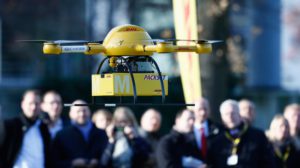Navigating the Future: What Drone Operators Need to Know
1Up Aerial Drone Services, Inc., a subsidiary of American Infrastructure Group, Inc.
The impending legislative changes to the National Defense Authorization Act (NDAA) as discussed in a prior article “The DFR Act: A Double-Edged Sword for the American Drone Industry” could significantly disrupt the drone industry. This article explores how the experts at 1UP Drones can help drone pilots, service providers and critical asset owners navigate this evolving landscape while still providing much needed services and benefits to our customers.

Introduction
The drone industry is facing significant challenges with the introduction of legislation aimed at enhancing national security through increased tariffs and even a widespread ban on Chinese drones and components, affecting both new and existing drones already in service. As drone operators, service providers and critical asset owners brace for potential changes, understanding the nuances of these legislative activities are crucial for navigating the future landscape.
Legislative Changes to the National Defense Authorization Act (NDAA) at a Glance
The “Countering CCP Drones Act” targets drones manufactured in countries identified as national security threats, primarily focusing on Chinese companies like DJI. The key components of the bill include:
- Ban on New DJI Products: The legislation aims to prevent new DJI drones from entering the U.S. market, effectively halting their sale and distribution.
- Revocation of FCC Approvals: Perhaps the most disruptive element is the potential retroactive revocation of existing FCC approvals. This means drones already in use could be grounded if their FCC certifications are invalidated.
- Impact on Federal and State Agencies: Federal agencies will be prohibited from procuring and using DJI drones. This ban could also influence state agencies, mirroring similar restrictions seen in states like Florida and Arkansas.
Key provisions of the “DFR Act” include:
- Tariffs on Chinese Drones and Components: Imposes an initial 30% tariff on drones and components from China, increasing by 5% annually until 2030. This measure targets reducing Chinese dominance in the U.S. market by making their products more expensive.
- Ban on Chinese Components: By 2030, the Act requires that drones imported in the the U.S. must not contain any critical components manufactured in China. This ban aims to eliminate potential security risks.
- Grants Program: The revenue from these tariffs is intended to fund a grant program for first responders, critical infrastructure providers, and farmers to purchase secure, American-made drones. This aims to enhance the competitiveness of U.S. drone manufacturers.
Implications for Drone Operators
As of early 2024, the FAA has issued 377,447 Remote Pilot Certificates under Part 107. For those drone service providers as well as critical infrastructure owners and public safety agencies, this legislation presents several challenges:
- Operational Disruptions: Companies that rely on DJI drones for federal contracts or operations on federal land may need to find alternative solutions quickly. The ban could lead to significant downtime and operational adjustments.
- Financial Impact: The cost of replacing DJI drones with compliant alternatives could be substantial. This financial burden is particularly concerning for smaller businesses and public safety agencies with limited budgets.
- Regulatory Compliance: Drone operators will need to stay abreast of the evolving regulatory landscape to ensure compliance and avoid penalties.
It is estimated that there are over half a million Chinese-made DJI drones operating in the United States, and DJI drones account for more than 50% of drones sold in the U.S. Their market share in the commercial sector is about 70%, and it is over 80% in the first responder sector.
1UP Drones Perspective
At 1UP Drones, we will stay engaged and informed regarding this rapidly evolving legislative activity by collaborating with drone operators, drone companies and suppliers, and industry leaders to identify products, methods and alternatives that allow you to achieve operational excellence in today’s environment. There is no single solution that meets the needs of everyone. Instead, we embrace our culture of continuous innovation, improvement, creativity and agility to develop pioneering solutions that address the critical needs of our clients.
Partnering with 1UP Drones
In these ever-transformational and complex times, 1UP Drones remains laser focused on providing services and technology that deliver unparalleled value to our clients. We accomplish this with cutting-edge technology and services that catalyze growth, enhance efficiency, extend asset lives, and ensure resilience in an ever-evolving infrastructure and situational awareness landscape.
At 1UP Drones, we prioritize understanding your unique challenges and goals, and strive to exceed your expectations by delivering tailored, high-quality infrastructure technology and services that drive your success. Finding creative and actionable solutions to extremely complicated problems under seemingly impossible constraints is what we love to do best. As a subsidiary of the premier infrastructure services provider American Infrastructure Group, Inc., we at 1UP Drones have the experience to make fact-based decisions with confidence so together as a team, we can meet the critical infrastructure and situational awareness needs of our nation.
Visit our website at www.1updrones.com, email info@1updrones.com or give us a call at 972-808-5185. 1UP Drones – Elevating infrastructure and situational awareness, one flight at a time! 1UP Drones is a proud subsidiary of American Infrastructure Group, Inc. (AIGI).
References
- Singh, I. (2024, June 6). DJI drone ban: US could decide company’s fate on June 12. DroneDJ. DroneDJ
- UAV Coach. (2024). A Federal DJI Ban Is Coming—Here’s Why It Matters. UAVCoach. UAVCoach
- Security Industry Association. (2024, January 30). Highlights From the 2024 National Defense Authorization Act (NDAA) and What It Means for the Security Industry. Security Industry Association. Security Industry
- Office of Senator Rick Scott. (2023, July 20). Sen. Rick Scott’s Bipartisan American Security Drone Act Added to NDAA. U.S. Senate. Rick Scott Senate
- MavicPilots. (2023, May 5). New Bill Introduced Banning DJI In US is Serious – With FCC Punch. MavicPilots. MavicPilots
- Kesteloo, H. (2024). Will The U.S. Ban DJI Drones? Here’s What You Need To Know. DroneXL. DroneXL
- DJI ViewPoints Team. (2024). Get The Facts: The Countering CCP Drones Act Will Hinder The American Drone Ecosystem. DJI ViewPoints. DJI ViewPoints
- Defense News. (2024). DJI isn’t the only Chinese drone threat to US security. Meet Autel. Defense News. Defense News
- Federal Aviation Administration. (2024). Drones by the Numbers. FAA. FAA
- CISA. (2024). Cybersecurity Guidance for Chinese-Manufactured UAS. CISA. CISA
- Digital Camera World. (2024). The best DJI drones in 2024. Digital Camera World. Digital Camera World


